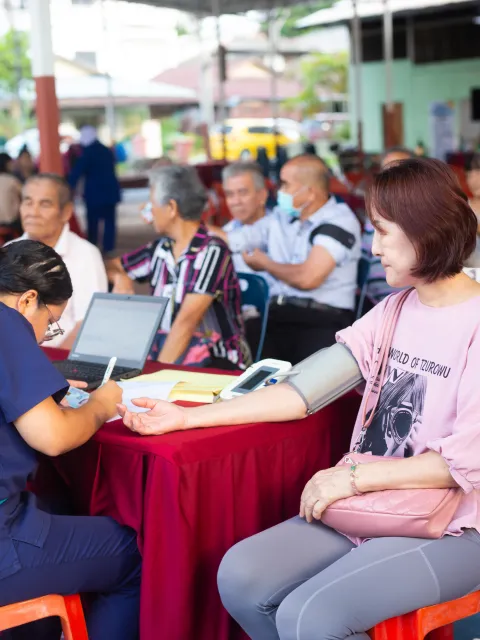UICC report highlights strategies to improve access to breast cancer treatment and care in low-resource settings
UICC worked in collaboration with WHO to increase understanding and knowledge to support the implementation of WHO’s Global Breast Cancer Initiative.
UICC is pleased to issue its report capturing key discussions and outcomes from a workshop titled ‘Advancing breast cancer treatment and care in resource-limited settings’.
The workshop was held during the World Cancer Congress in Geneva, Switzerland, in September 2024, and addressed critical strategies for improving access in resource-limited settings to breast cancer treatment and care, encompassing surgery, chemotherapy, radiotherapy, and supportive and palliative care.
The event was organised by UICC with the support of UICC’s Breast Cancer programme partners and organised in collaboration with WHO’s Global Breast Cancer Initiative (GBCI). It was attended by 54 participants from 33 countries, including leaders from civil society organisations, governments, academia, the private sector, and technical partners.
The central focus was on progressing towards the GBCI’s third pillar target: ensuring at least 80% of patients receive and complete recommended breast cancer treatments from the moment of diagnosis and without abandonment. The overarching objective of the GBCI is to reduce global breast cancer mortality by 2.5% per year, averting 2.5 million breast cancer deaths globally by 2040.
The event built upon discussions from the 2022 WCC workshop, which concentrated on early detection and timely diagnosis, to explore the challenges and opportunities in providing comprehensive breast cancer care.
Key speakers at the workshop addressed how to overcome the many barriers that limit the accessibility and affordability of medicines and diagnostics to improving breast cancer outcomes in resource-limited settings.
Dr Mary Nyangasi, Technical Officer at WHO and lead of the GBCI, provided an overview of the GBCI’s three pillars and the principles of multimodality treatment, highlighting the disparities in breast cancer survival rates between high-income countries and low- and middle-income countries (LMICs).
“Where you live should not determine if you live, we have all the tools we need to revolutionise access to breast cancer treatment everywhere, and save lives.”
– Mary Nyangasi, Technical Officer at WHO and lead of the WHO Global Breast Cancer Initiative
Shalini Jayasekar Zürn, Senior Advocacy Manager at UICC, outlined efforts through partnerships such as the ATOM Coalition to address the inequitable access to essential medicines and diagnostics for LMICs. This requires addressing structural limitations and working towards well-developed diagnostic systems that can accurately determine the appropriate treatment for each patient.
The workshop also underscored the pivotal role of patient navigation in facilitating timely access to information, services, and ensuring patients stay on and finish their full course of breast cancer treatment. These programmes play a crucial role in guiding patients through complex healthcare systems, ensuring they receive timely care and adhere to treatment plans. By addressing individual and system-level barriers, patient navigation can improve cancer screening rates, reduce delays in diagnosis, and enhance overall treatment outcomes.
A panel comprising Dr Miriam Mutebi (President, AORTIC), Kara Magsanoc-Alikpala (Founding President, ICANSERVE Foundation), and Dr Julie Gralow (Chief Medical Officer and Executive Vice President, ASCO) provided further insights on these topics.
Panellists presented various actions to improve prevention and early detection, including educating women about breast cancer, notably recognising early signs and symptoms and the need for screening. They also emphasised the need to empower patients with knowledge about their disease and treatment options, so they are then more likely to make proactive decisions about their health and adhere to treatment plans.
In particular, developing and implementing culturally sensitive breast cancer screening programmes was presented as a way to ensure that screening initiatives are well-received and effective within diverse communities.
Involving men in discussions about breast cancer was also suggested as a means of promoting awareness about prevention, as well as encouraging male support for female relatives and friends undergoing treatment. Community-based support programmes for women with breast cancer could provide emotional, social, and practical assistance.
Panellists also highlighted the need for research efforts tailored to the specific needs and challenges of breast cancer in resource-limited settings, particularly in regions such as Africa.
Finally, technology was identified as a potential tool to improve access to breast cancer care, allowing for remote consultations, mobile health interventions, and online educational resources. Treatment plans could also be made more holistic and accessible by integrating traditional and complementary medicine into breast cancer care.
Join discussions related to women and cancer on UICC Connect
Last update
Monday 10 March 2025
